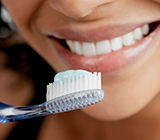Types of professional whitening procedures
- In-practice whitening - An in-chair treatment where whitening gel is applied to your teeth. The bleaching gel used in professional whitening treatments is strong, so your dentist will apply it with special care.
- Custom tray home use - This is similar to the in-practice whitening, but you can do it in the comfort of your own home using a milder whitening gel.
What makes professional whitening different?
You can bring the sparkle back to your smile with whitening products sold by your dentist, over-the-counter products and professional whitening treatments. All of these whitening methods contain various concentrations of active whitening ingredients like hydrogen peroxide according to the British Dental Bleaching Society. A stronger formula is more effective at lightening your teeth by several shades, which is why professional teeth whitening costs a bit more.
Getting your teeth whitened professionally offers a range of benefits that you don’t get if you choose to whiten your teeth at home. This includes:
- Dental Supervision - Before the whitening procedure, your dentist will perform an examination to make sure your gums and teeth are healthy for the treatment and determine if there are any crowns or veneers that will not be whitened.
- Stronger whitening agents - In-practice whitening procedures are carefully monitored as they use a higher concentration of bleach. For some patients, this may cause temporary sensitivity, so your dentist will take precautions to make sure the whitening gel doesn’t touch your sensitive gum tissue.
- Faster results - Because the concentration of whitening gel is stronger than what you'd get in an at-home whitening product, results are visible immediately rather than several weeks afterwards. You may only need one or two treatments to achieve results that last.
It’s essential to know that teeth discoloration may be caused by a specific underlying disease or condition that requires dental treatment. So, visit your dentist for a consultation before choosing a method to brighten your smile.
Who is professional whitening for?
The good news is that professional teeth whitening is right for most people with permanent teeth and good oral health. If you don’t experience gum sensitivity or receding gums, then you may be less sensitive to chemicals in whitening procedures. Professional whitening usually works well for people with stubborn, yellow stains but may not always whiten brown or grey stains. Whitening treatments are a great option for people who haven't had previous work done, as tooth-coloured fillings, crowns and caps can’t be whitened like the rest of your teeth. You can always consult with your dentist to find out if you’re a good candidate and for information on the teeth whitening options available to you.
How much does teeth whitening cost?
Teeth whitening cost will very much depend on your dentist and its location, for example, dentists based in big cities are likely to cost more. However, you’ll likely find that kits for teeth whitening at home that are provided by your dentist are cheaper than in-chair bleaching treatments. Laser whitening at the dentist is normally the most expensive method you can choose as it can give the quickest results.
Alternative teeth whitening solutions
If you can’t get a professional whitening treatment due to teeth whitening cost or other factors, don't worry, there are plenty of alternative whitening solutions that can help you improve your smile:
Professional cleaning - Regular dental cleaning helps reduce and may even remove staining on your teeth.
Veneers or bonding - Aesthetic procedures are a great option if you have had restorative work to the front teeth. Veneers or bonding can help you get the dazzling smile you want.
Over-the-counter whitening products - Whitening toothpaste, strips and whitening gels are affordable options that can help with minor discoloration and surface stains.
Is professional whitening worth it for you?
Once you know you’re a good candidate for professional teeth whitening, you can begin choosing a method to brighten your smile - this will depend on your personal preference and the teeth whitening cost. If you're looking to flash a smile soon, professional in-practice whitening will get you quick results. For more sensitive teeth, your dentist may recommend a custom-fitted whitening tray to use in the comfort of your home. In addition, there are lots of affordable and convenient over-the-counter whitening products that can help you get to the bright smile you deserve!
ORAL HEALTH QUIZ
What's behind your smile?
Take our Oral Health assessment to get the most from your oral care routine
ORAL HEALTH QUIZ
What's behind your smile?
Take our Oral Health assessment to get the most from your oral care routine













